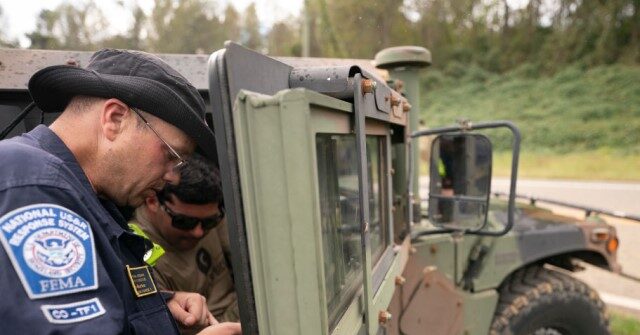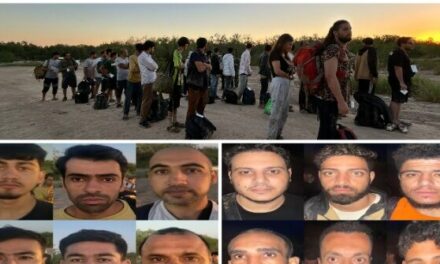We support our Publishers and Content Creators. You can view this story on their website by CLICKING HERE.

In the wake of the ongoing devastation of Hurricane Helene, and with another storm looming, Americans are wondering what happened to the Federal Emergency Management Agency. FEMA is supposed to respond to disasters, not be one.
Cleanup and supply operations continue in the mountains near western North Carolina, and relief efforts also extend to parts of Georgia, Florida, South Carolina, and Tennessee. But the absence of, or delays in response by the agency tasked with helping in emergency situations has Peter Schweizer and Eric Eggers investigating the reasons about why FEMA lost its effectiveness on the latest episode of The Drill Down.
Hurricane Helene is responsible for hundreds of deaths in the storm path. Its storm surge reached thirty feet in some places. Roads have been washed out and are impassable. Private charity groups have been flocking to the area, offering airlift operations to bring supplies to people. And FEMA has made that job harder.
The problem is a shift in the organization’s priorities, known as mission creep. That diverts time, energy, money, manpower to other priorities. FEMA now spends large amounts on sustaining illegal immigrants that have come across the southern border, which the White House’s spokeswoman initially tried to deny. The reason, Schweizer says, is rooted in bureaucracies and how they evolve.
“It’s a classic story about government. If you’re a government agency, you can only do a couple of things really well… And what you’re seeing with FEMA is involvement with illegal migration. This diverts resources. It diverts personnel. And it also diverts training, because the sort of work you have to be doing in North Carolina right now or in Florida or in Georgia is very different than the work that they’re doing on the border,” Schweizer said.
The founders of a private group calling itself “Operation Helo” complained to CNN this weekend about FEMA not being there. Tim Kennedy, another man also engaged in airlift work, said he was frustrated by FEMA’s actions when they finally did get there. “They’re here, but they’re getting in the way. They’re not helping,” he said.
But that kind of mission creep is what federal agencies do to expand their budget.
“And why do they do that?” Schweizer asks. “Money. Money. There’s only so much they’re going to spend on disaster relief [each year]. So, FEMA says, ‘Hey, let’s get involved in a bunch of other things so we can increase the size of the budget we get from the federal government every year.’”
He also explained the allegation by the Trump campaign that FEMA has been giving away money to migrants that it should have had for storm victims.
“What is 100% true is that FEMA’s emergency food and shelter program has been reshaped to provide funding to ‘families and individuals encountered by the Department of Homeland Security.’”
How much money? Schweizer continues, “$685 million has been reallocated to fund illegal aliens. That’s been reported by a number of outlets,” he said.
FEMA’s reputation was definitely not helped when a news outlet this week uncovered a recorded conference call where FEMA managers at its “Office of Resilience” were discussing the topic “Embracing equity in disaster relief.” The meeting organizer urged attendees to shift from a utilitarian approach (the greatest good for the greatest number) and instead think about something called “disaster equity.”
The hosts ask: what does “disaster equity” even look like?
This points to a second cause of FEMA’s poor responsiveness: It has become politicized.
So, when FEMA announces that $800 million in its funding will go to a program to “proactively build up infrastructure in disadvantaged communities,” they are referring to racial demographics. Appalachia, where much of the hurricane damage has occurred, is an overwhelmingly white part of the country.
The phenomenon of getting political is not unique to FEMA, as Eggers points out. The US Agency for International Development two years ago used $2.6 billion of its budget to “advance gender equity around the world.”
The hosts also mention another astonishing story, first reported by the Washington Post. For the last four years, the National Oceanic and Atmospheric Administration (NOAA) won’t release its most accurate hurricane tracking predictions to the public, spurring concerns that it is holding back information that could help people prepare for deadly storms.
A 2020 contract between NOAA and an insurance-related company called RenaissanceRe Risk Sciences was obtained in a Freedom of Information Act request by the Post, which shows NOAA must keep its most accurate predictions about hurricane paths secret for five years.
For our readers and viewers who want to help, we recommend reaching out to Samaritan’s Purse and the Salvation Army, both of whom have been in the area since the first calls for help went out. Many churches are organizing groups of volunteers to go to the area and assist with the rebuilding and cleanup operations.
For more from Peter Schweizer, subscribe to The DrillDown podcast.

 Conservative
Conservative  Search
Search Trending
Trending Current News
Current News 







